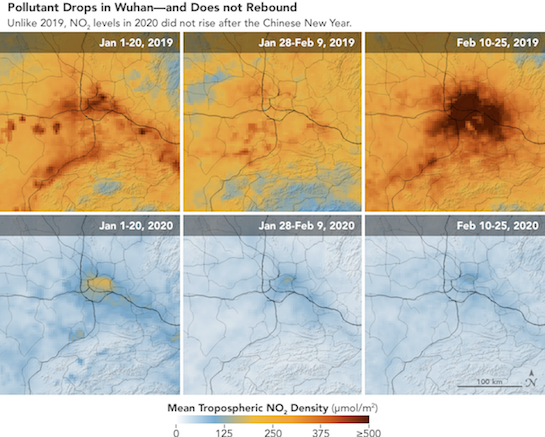Within the past couple of months, a large portion of society throughout the world has grinded to a halt in an effort to stop the spread of the novel coronavirus. Amidst the reports on the virus and its economic impacts, a new finding has emerged indicating that the environment may be benefiting from this decrease in human activity.
The environmental movement recognizes as a principle that human activity has damaged the planet’s environment, mostly through pollution from industry and travel. In light of the widespread social distancing orders recently put in place, however, emissions of harmful greenhouse gases such as carbon dioxide (CO2) have decreased significantly as people have nowhere to go, and only essential businesses are still operating in many regions. This is the case on a global scale, even in countries which are notorious for pollution such as China, which, according to carbonbrief.org, temporarily decreased its CO2 emissions by 25 percent in February.
Despite this seemingly good news, experts say that a brief lapse in high emissions does not indicate any long-term improvement for the environment. Once countries start up again as usual, emissions may be even higher as the economy does its best to make up for lost time. In order to make real long-lasting change, leaders will have to find sustainable methods of running society while maintaining both a healthy economy and environment.
While miles left untravelled, such as daily commutes to work, will not be made up for when the crisis resolves, it is unclear whether people will travel more or less often than before. People may still take trips they had planned at a later date, for example.
“I think that for a short time after the quarantine is lifted we will want to go out a bit more as individuals since we have been stuck home so long,” Samantha Nieves (’22) said. “I know I will want to go out to lunches with my friends and my mom as well.”
Despite the pressing issue of the coronavirus pandemic, the European Commission has said that its Green Deal would be central to recovery efforts. Meanwhile, in the U.S., a controversial move has been made in the form of an order by the Environmental Protection Agency; the policy states that companies will be permitted to monitor themselves and that violations of usual requirements will not be enforced with fines during the outbreak.
“I do think it is okay to focus on [health and the economy], but we should also make sure we do not throw the state of the environment out of the window. I think if we want to consider our future as humanity overall, then we should balance it out,” Chris Calderon (’20) said.
In an effort to spread positivity in uncertain times, many have shared and reposted “good news” on social media which often includes news of miraculous occurrences suggesting that nature is benefitting from the decrease in human activities. These viral posts have perpetuated myths, including stories of animals in previously populated areas and visibly cleaner waterways.
However, sources such as National Geographic have debunked these feel-good anecdotes as either false or misconstrued. For example, the water in the Venice canals in Italy has become clear not due to a lack in pollution, but instead because of decreased boat activity that stirs up sediment and brings it to the surface.
Nevertheless, it is clear that the environment has undergone positive change since travel and non-essential business were scaled back across the globe, especially in major cities in which severe stay-at-home orders have been issued.
Regardless, scientists have stressed that this situation is unsustainable as a means of protecting the Earth. When the economy inevitably starts back up at fall force, emissions and pollution will only rise again unless policymakers make the economy greener. Many are hopeful that the extent and speed seen in response to the virus throughout the world could eventually translate into effective climate change action.
Just like several movie releases and the 2020 Summer Olympics, the United Nations climate change conference, the COP26 summit, has been postponed until next year, according to UN News. It had largely been viewed as the most important climate gathering since the signing of the 2015 Paris Climate Agreement. This could either provide extra time for nations to prepare or cause delays in countries taking action.
The coronavirus has yielded temporary benefits to the environment and brought attention to global environmental concerns; however, only time will tell how the long term fight against climate change and other environmental concerns will continue throughout the world.





